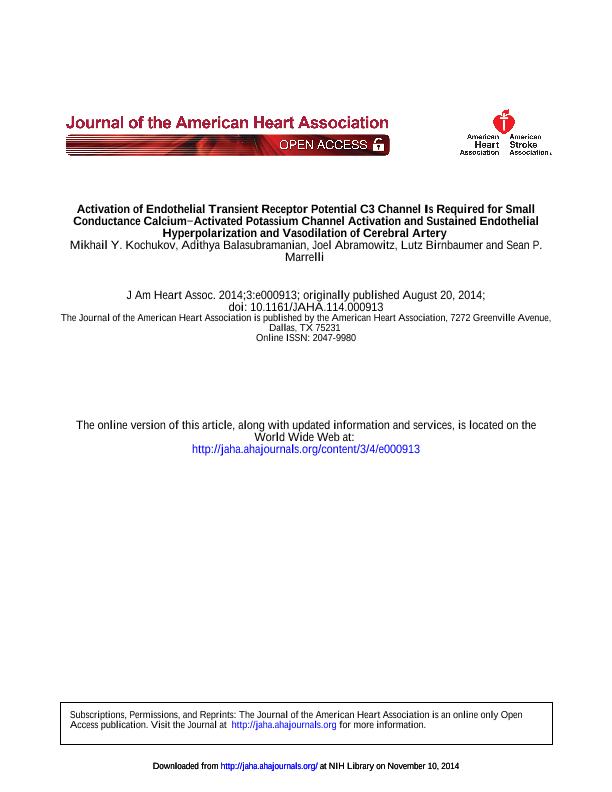Artículo
Activation of endothelial transient receptor potential C3 channel is required for small conductance calcium-activated potassium channel activation and sustained endothelial hyperpolarization and vasodilation of cerebral artery
Kochukov, Mikhail Y.; Balasubramanian, Adithya; Abramowitz, Joel; Birnbaumer, Lutz ; Marrelli, Sean P.
; Marrelli, Sean P.
 ; Marrelli, Sean P.
; Marrelli, Sean P.
Fecha de publicación:
08/2014
Editorial:
John Wiley & Sons Inc
Revista:
Journal of the American Heart Association
ISSN:
2047-9980
Idioma:
Inglés
Tipo de recurso:
Artículo publicado
Clasificación temática:
Resumen
BACKGROUND: Transient receptor potential C3 (TRPC3) has been demonstrated to be involved in the regulation of vascular tone through endothelial cell (EC) hyperpolarization and endothelium-dependent hyperpolarization-mediated vasodilation. However, the mechanism by which TRPC3 regulates these processes remains unresolved. We tested the hypothesis that endothelial receptor stimulation triggers rapid TRPC3 trafficking to the plasma membrane, where it provides the source of Ca(2+) influx for small conductance calcium-activated K(+) (SKCa) channel activation and sustained EC hyperpolarization. METHODS AND RESULTS: Pressurized artery studies were performed with isolated mouse posterior cerebral artery. Treatment with a selective TRPC3 blocker (Pyr3) produced significant attenuation of endothelium-dependent hyperpolarization-mediated vasodilation and endothelial Ca(2+) response (EC-specific Ca(2+) biosensor) to intraluminal ATP. Pyr3 treatment also resulted in a reduced ATP-stimulated global Ca(2+) and Ca(2+) influx in primary cultures of cerebral endothelial cells. Patch-clamp studies with freshly isolated cerebral ECs demonstrated 2 components of EC hyperpolarization and K(+) current activation in response to ATP. The early phase was dependent on intermediate conductance calcium-activated K(+) channel activation, whereas the later sustained phase relied on SKC a channel activation. The SKC a channel-dependent phase was completely blocked with TRPC3 channel inhibition or in ECs of TRPC3 knockout mice and correlated with increased trafficking of TRPC3 (but not SKC a channel) to the plasma membrane. CONCLUSIONS: We propose that TRPC3 dynamically regulates SKC a channel activation through receptor-dependent trafficking to the plasma membrane, where it provides the source of Ca(2+) influx for sustained SKC a channel activation, EC hyperpolarization, and endothelium-dependent hyperpolarization-mediated vasodilation.
Archivos asociados
Licencia
Identificadores
Colecciones
Articulos(IIB-INTECH)
Articulos de INST.DE INVEST.BIOTECNOLOGICAS - INSTITUTO TECNOLOGICO CHASCOMUS
Articulos de INST.DE INVEST.BIOTECNOLOGICAS - INSTITUTO TECNOLOGICO CHASCOMUS
Citación
Kochukov, Mikhail Y.; Balasubramanian, Adithya; Abramowitz, Joel; Birnbaumer, Lutz; Marrelli, Sean P.; Activation of endothelial transient receptor potential C3 channel is required for small conductance calcium-activated potassium channel activation and sustained endothelial hyperpolarization and vasodilation of cerebral artery; John Wiley & Sons Inc; Journal of the American Heart Association; 3; 4; 8-2014; 1-17
Compartir
Altmétricas



